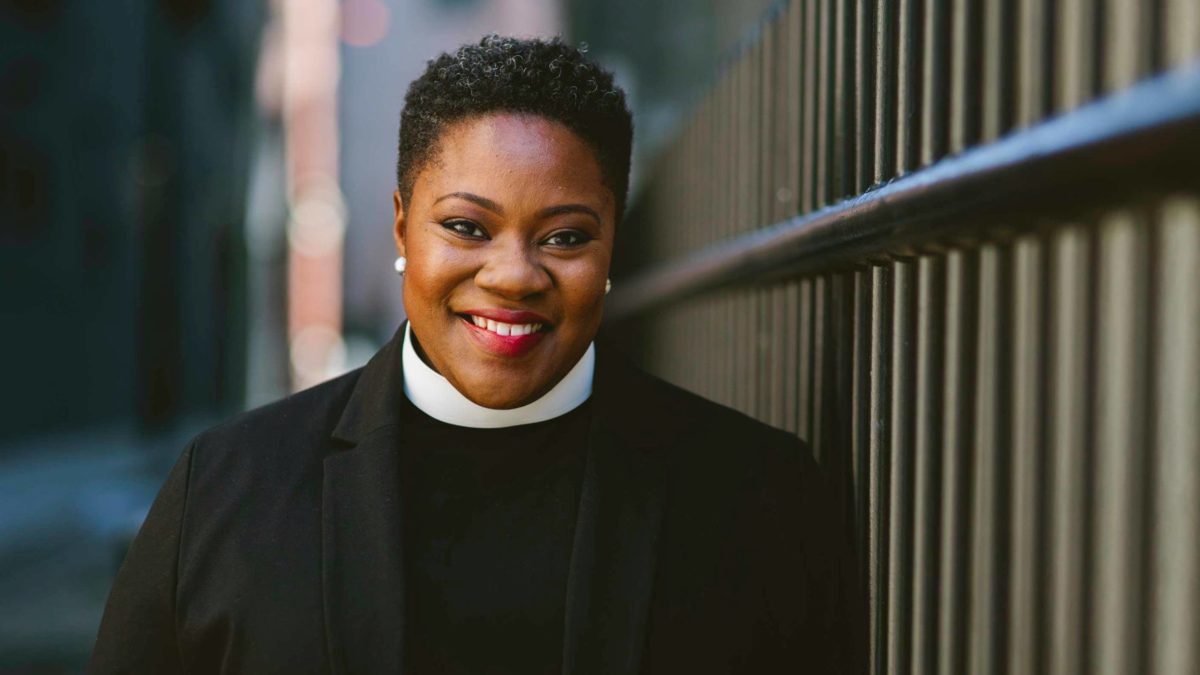Reverend Naomi Washington-Leapheart of Chestnut Hill is a part of a growing movement of inclusive and sex-positive Christian clergy.
Raised “in a Baptist church on the west side of Detroit,” Rev. Washington-Leapheart completed seminary in 2016 and is now an ordained minister, affiliated with the Fellowship of Affirming Ministries.
“I believe that all people, including LGBTQIA people, are made in God’s image and are vital shapers of religious life and community,” says Rev. Naomi Washington-Leapheart, a faith work director at the National LGBTQ Task Force with headquarters in Washington D.C., New York City and Miami. Locally, Washington-Leapheart is an adjunct professor of Theology and Religious Studies at Villanova University. “We should not be merely tolerated or tokenized – our spiritual practice and faith leaders should be taken seriously.”
In February, representatives of the United Methodist Church gathered at a special conference in St. Louis to settle the increasingly unsustainable controversy regarding LGBT inclusion.
Many bishops supported a path that they dubbed the “One Church Plan.” It would allow individual congregations and clergy to decide how to approach same-sex marriages and LGBT ordinations. But delegates narrowly voted this down in favor of the so-called Traditional Plan, which affirmed the Church’s opposition to homosexuality.
Since the vote, the division between clergy has only increased. Many progressive Methodist churches are likely to leave the denomination, ignore the vote, or withhold payments as a form of protest. Worldwide, the United Methodist Church has 12 million members. As the primary Protestant denomination in the United States, this rift could have significant impacts on Christianity overall.
––
“I believe that all people, including LGBTQIA people, are made in God’s image and are vital shapers of religious life and community. We should not be merely tolerated or tokenized – our spiritual practice and faith leaders should be taken seriously.”
– Rev. Naomi Washington-Leapheart, faith work director at the National LGBTQ Task Force
––
Methodists are not alone in grappling with the inclusion of LGBT people and sexuality in general. Modern Christian churches vary dramatically, not only on allowing same-sex weddings and openly gay clergy but in some cases, even having women officiants. A search of what the scripture calls for in certain moments does not bring unanimity.
“The Bible contains many stories about people who were on the margins of their societies but who were specifically called by God and their communities to lead,” says Rev. Washington-Leapheart. “Acts 2:16-18 is [has text referencing] the idea that God’s Spirit will pour out on ALL flesh, which includes Black, Brown, indigenous, poor, queer, trans, undocumented, and disabled flesh.”
She is not the only Philly-area clergy who espouses this interpretation.
Reverend Beverly Dale, ecumenical campus minister at the University of Pennsylvania, says the criteria for membership and leadership in the church have nothing to do with orientation or gender.
“[It comes down to] righteous living,” said Rev. Dale, an ordained Christian Church minister. “And, even then, we are not to be the judge to tell others whether or not they are living righteously! God knows the heart. Christians have been sold a bill of goods through centuries of misogynistic, homophobic and erotophobic teachings developed several hundred years after Jesus by elite men who were sexually conflicted.”
She tries to bridge the gap between sexuality and faith in her work; as the host of the YouTube series “Sex is Good” and the co-author of a new book, “Advancing Sexual Health for the Christian Client: Data & Dogma,” aimed at both pastoral counselors and sexual health professionals.
“Most of the current teachings on sex that are restrictive – in regards to the body, pleasure and women – have nothing to do with Jesus or the gospels, either in his life or his teachings, and, just to be clear, they are scientifically unsupportable,” said Rev. Dale. “Sexual repression and the guilt and body shame [that come along with it] are harmful to sexual self-esteem, relational happiness and sexual fulfillment. The church got off track from its message of living in love when it began obsessing about living in sin.”
For those reared in churches that are historically unwelcoming to openly gay clergy or choose to teach very narrow messages about sexuality, these perspectives can be confounding. For many Americans, it may look like we must choose between spirituality and progressive political values. But that’s not the case, says Reverend David Norse Thomas, who is openly gay and married.
“If you’re part of a religious community, make sure they’re actually affirming,” says Rev. Norse, a former Philly resident, who today is the pastor of Maryland Presbyterian Church in Towson, Maryland. “[There’s a website called] Church Clarity [and it’s] great and [for seeing] what your congregation’s views are. You might be surprised. If you’re an ally, it might be time to think about going somewhere that actually holds your views, or challenge your leadership.”
Are these radical new beliefs? Are these simply new political trends that aim to upend the teachings of Jesus? Not really, says Michael Ruk, an Episcopal priest.
“Jesus speaks very little about sexuality in the New Testament, but he does constantly include and expand the Kingdom of God to the outcast and embraces them,” said Ruk, who leads St. Philip’s Episcopal Church in New Hope. “It’s not one text, but the entirety of Jesus’ life and the ministry which informs this belief. [It’s really all about looking] at the collective understanding of transformative teachings of Jesus.”
Ruk, who is also openly gay, says a third of his congregation is LGBT and that the church takes part in the Pride Parade every year. He goes so far as to apologize on behalf of Christians for their history of sexism, homophobia and the damage it has done.
“Spiritual abuse is unnecessary and very dangerous,” said Ruk, who added, “[But] there are places where you will be loved and supported in your life as a child of God. My tradition and others, want to see an inclusive and affirming understanding of the whole person. I would encourage those in faith communities which do not support your life to find one that does.”
TWITTER: @TIMAREE_LEIGH





